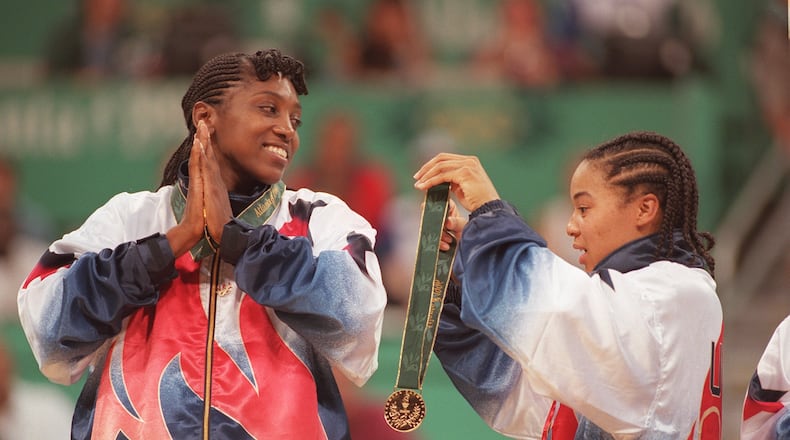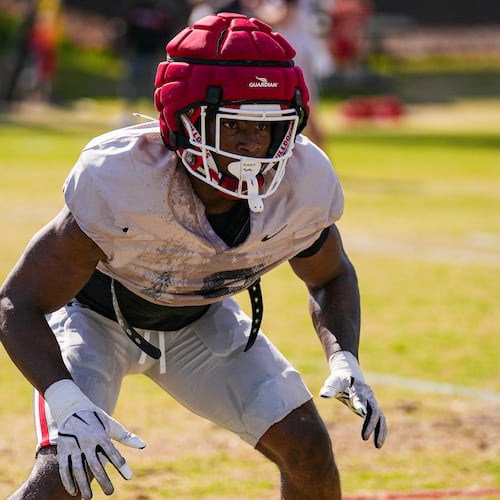University of Georgia alum Teresa Edwards has played basketball literally all over the world, most notably in five different Olympic Games. And since she hung up her sneakers, she’s had some role in most every Olympic competition since.
Until now. Edwards found herself in an unusual position this summer. Her participation in the 2020 Tokyo Games has consisted of her sitting on her couch in her New York City apartment and watching them on television.
And, actually, she has loved it.
“I’m mesmerized by it,” said Edwards, genuine wonderment in her voice. “I’m learning a lot of new kids, a lot of great athletes. I’ve been following swimming and diving and gymnastics and fencing. I catch myself watching everything. I think it’s mainly because I hadn’t really taken an opportunity to really embrace it before. Being on that stage and performing all the time, you really don’t see it the same way as when you sit down and watch it. But now, as an old woman, I’m totally embracing it. It’s beautiful!”
At 57, Edwards is hardly an “old woman,” but her perspective definitely has changed. A member of both the Women’s Basketball and FIBA halls of fame, for years she has been best known as the women’s basketball player who played in more Olympics than anyone else in history – five. That record was tied this year by USA Basketball’s Sue Bird and Diana Taurasi.
She’s usually involved in the games in some ambassadorial or broadcasting role. But Edwards remained stateside this year because of the coronavirus pandemic and international travel concerns.
But the Games are never far from Edwards’ mind, and she recently put it all down in a book. Edwards recently released an autobiographical audiobook about her experiences. Cleverly titled Black Gold, the two-hour, 31-minute recording includes some startling revelations from the 1996 Atlanta Games. That includes the seemingly indefatigable Edwards contemplating quitting the game.
Thankfully for us all, she never did. As a result, Edwards remains one of the Bulldogs’ greatest points of athletic pride. This once demure, compliant athlete from little Cairo in Grady County was listed No. 22 on Sports Illustrated’s compilation of the greatest female athletes of the 20th century.
Following are excerpts of an extensive interview with Edwards this week in which she shares about her book, what her life is like now and her view of the biggest news from the 2020 Games – Simone Biles’ decision to pull out of most of the gymnastics’ competition.
Q: I know you’ve been interviewed on CNN and BNC about the Biles’ controversy in gymnastics. Can you share your thoughts on it with us?
A: That’s all everybody wants to talk about, “Is Simone Biles suffering from mental fatigue” or whatever they want to call it out there. I think it’s interesting. If people listen to my story, they’ll realize that everybody deals with this thing on different levels. Simone is on a major platform; her stage is the biggest in the world today. So, everything she does is under a microscope. That’s true for most of the athletes, or most of the successful ones, anyway. And I don’t know what her struggles are; we don’t know the internal things. But when people listen to my book, they are going to say, “I didn’t know Teresa was dealing with that.” That’s because we didn’t really voice those things then. We had to carry on and conform to the elite level and be at our best. We had to shove a lot of things aside. But we’re human.
So, as far as Simone goes, I thought that was actually very, very courageous of her. She actually did this to save the team. I can identify with that, because I’m a team player and that’s what I saw. It was amazing and brilliant of her to say, “I’m going to hurt the team if I stay out there.” What does that do? In turn, she elevated every one of those ladies. In turn, she taught us what it is to be on a team. At the end of everything, what does she really have to prove at this stage? … So I support her. I tremendously support her.
Q: We learn in your new book, Black Gold, that you were dealing with a lot of things behind the scenes that nobody knew about. What can you share about that experience and deciding to put it out there now on the 25th anniversary of the 1996 Atlanta Games?
A: Well, it’s an amazing story people really haven’t heard. I’m not one to really speak out, you know. When I’m going through things, when I’m going through hard times, I was the athlete who fought through it, kept the peace, kept quiet. You know, I was in a team sport, so you don’t invite those things in. You just kind of get through the process.
This was a process where I learned a lot about myself. Ninety-six was golden for everybody, right? It was just one of those times where we were taking off. Women’s basketball was at a place where we could actually go over into bigger schemes of professionalism. This team was definitely provided an amazing train ride uphill to land on top of the podium. The professional leagues followed us being undefeated. So, this was a book that allowed me to tell the story within the story. I definitely learned a lot about myself. And I’ve never spoken about any of it in the media. I think that’s what makes it unique.
Q: What made you want to write it?
A: Because it’s inspiring! It’s not just about basketball. I’m not one of those athletes who thinks I need to go over my statistics. You know, everyone knows about the five Olympics, everyone knows you’ve played a tons of games and scored a lot of points. Otherwise, as an athlete you wouldn’t have a book to write. I don’t like reading those types of books. So I had to ask myself, “What am I about; what do I have to offer?” And this book has turned out to be very inspiring to people. I think it’s insightful in a way that challenges you as a person, not just the athlete. I think the young kids growing up in the sports world today can definitely take a lot out of it. It’s about dealing with coaches, dealing with yourself. I was challenged to question so much about myself during this time span and how I dealt with in the context of the outcome.
Q: You contemplated quitting?
A: I could’ve chosen to quit. Did I think about it? Yeah. Have I ever said anything about that? No, not until now. It’s very honest, and people want to hear honesty. It’s honest and gut-wrenching. It takes me back to those emotions I was feeling. I’m actually trying to have a conversation with (the listener). You’re sitting there and listening to me talk to you. Some reviewers have said felt like they were having a conversation with me, and I feel very good about that.
Q: And it’s actually you narrating the whole thing?
A: My voice is so wonderful you just can’t get enough of it.
Q: How do you feel about Sue Bird and Diana Taurasi tying your record for Olympic basketball appearances?
A: I think it’s great, man! What else would I think? When I was playing, I didn’t even realize I was setting a record. I was doing it strictly for the love of it. I just kept going like a fool. I should have gotten a job somewhere along the way. But I just kept going and it just happened to be five. Sometimes I laugh about it and say, “You could have done six” and that would’ve really made it interesting. But, no, I think it’s great. I think it helps women’s basketball. I think they’re phenomenal. It’s overshadowing, somewhat I think, Dawn Staley. She’s one of the first Black coaches of an Olympic team. I’m more proud of that because I’ve played with her and watched her coach herself into another whole level of success. So I’m watching it all. I’ve been hurting the next day from staying up all night watching them play. I can’t help but want our success to continue. This will be seven gold medals for USA women’s basketball since 1996. So, we’re all in this together, absolutely, and I want them to do it.”
Q: How have you felt about the 2020 Games overall?
A: They’re getting it done during a pandemic. It’s a courageous group of people who are out there still performing. But athletes are simply wired to do what they do no matter what. I remember some stuff happening in Atlanta while we were there, the bombing and everything. But we were just wired to play. You have respect for whatever’s going on, but if the Games are going on, we’re going to fight and compete. So, I think there are a lot of courageous athletes over there.
Secondly, I think Japan is doing a good job in spite of so many things going against it. They want to put on a great show. I love Japan. I played four seasons over there professionally and I loved it. I played with Mitsubishi in Nagoya, and I loved the Japanese people and the Japanese culture. They were nothing but great for me. I was hoping before all this hit that I could find my way back to Japan. But I think they’re doing a great job.
The Olympics is doing what they’re supposed to do. It’s supposed to actually make us forget the problems of the world and give us a moment of renewal. We’re supposed to steal away in the moment and ride the ship of competition and athleticism and sportsmanship and things of that nature. And watch a little greatness take place.
So, hopefully everybody will look back and say, “That was good. We needed that.” I may be in the minority way of thinking here, but I’m not worried about ratings or any of that negativity. We could use some goodness in the world right now.
Q: What about your Bulldogs and coach Joni Taylor? You keeping up?
A: Joni is amazing. Joni and I stay in touch all the time. I follow the team all season long. I blow her phone up every game. I always make a comment or maybe something I wish she’d say to the team. No, Joni and I have a beautiful relationship and I love her. Those are my Dogs, man, and we’re on our way back up! Dawn (who also is coach at South Carolina) better watch out.
About the Author
Keep Reading
The Latest
Featured


